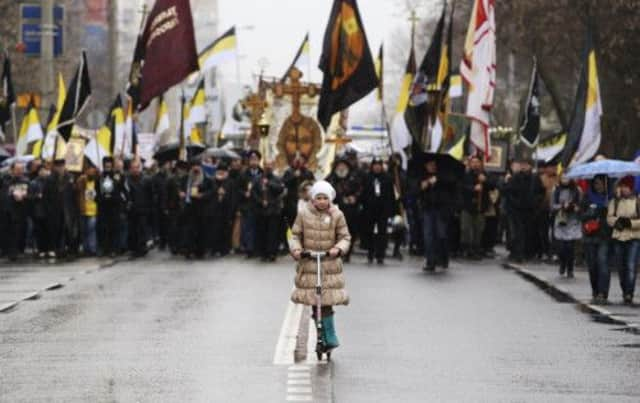Nationalists vent anger at migrants with Moscow march


The protest took place yesterday on Russia’s National Unity Day, a national holiday established in 2005 to replace commemorations of the Bolshevik Revolution. Many demonstrators carried Russian imperial flags. One group displayed a banner reading “Young People Against Tolerance”.
“Moscow has only just woken up, and Russians have only just started to recognise their identity,” said Alexander Belov, a nationalist leader and an organiser of the march.
Advertisement
Hide AdAdvertisement
Hide Ad“With every day Russian nationalists are gaining more and more support.”
Animosity is strong against migrants from the former Soviet Central Asian republics and against non-Slavs from the largely Muslim Russian Caucasus region. Central Asian migrants are widely employed in big cities in construction and do other low-paid jobs that Russians are not eager to do.
The protesters, from tough-looking youths and neo-Nazis to older people, marched in a quiet south-eastern district along a tree-lined boulevard.
The crowd attending the nationalist rally has grown more middle-class since 2005 when the first march was held. A string of well-publicised crimes committed by migrants has embittered many Muscovites, who see police as unwilling to prosecute the perpetrators.
A recent survey by the Levada Centre polling agency, taken on the eve of Moscow’s mayoral election in September, showed that immigration topped voters’ concerns. More than half of respondents said it worried them more than any other problem.
Authorities have largely ignored the flow of Central Asian migrants, neither trying to integrate the newcomers nor cut down on migration.
While some of the onlookers yesterday were displeased with the march, other locals said they were supporting it.
Yelena Yermakova, 56, who was taking a walk with her daughter and two grandchildren, said there are too many migrants in Moscow and they are “getting cheeky”.
Advertisement
Hide AdAdvertisement
Hide AdMonday’s rally came three weeks after rioters targeted a vegetable warehouse in the Biryulyovo district where they believed the alleged migrant killer of an ethnic Russian man was working. Police rounded up more than 1,000 migrants working at the warehouse.
Police later arrested a citizen from the mostly Muslim country of Azerbaijan for the murder.
Some demonstrators praised the riot and suggested it was backed by the state.
“People received a signal that if they engage in such pogroms, there will be progress,” said Yevgeny Morgunov, 37, a researcher at the Russian National Academy of Sciences.
He said he didn’t support the exclusionary sentiment reflected in the nationalist slogan “Russia for Russians”, but said “if Russians feel good, the other people of Russia will feel it too”.
Mr Morgunov said he and others would not be going to protests where neo-Nazis were marching if at least some nationalist forces were represented in Parliament.
Maria, 15, a schoolgirl, said she attended the Moscow march – her first – because of the warehouse incident.
She said: “After what happened in Biryulyovo I couldn’t not take part. I want to live in a country where immigrants act like guests, not where they own the place.”
Advertisement
Hide AdAdvertisement
Hide AdRussia has recently liberalised the entry of parties into politics, registering dozens of obscure political groups. But even mildly nationalist forces were not allowed to sign up.
About 30 people were detained at the rally for using Nazi slogans and symbols as well as for other minor crimes, Moscow police said.
Nationalist rallies were held in other Russian cities as well, including St Petersburg, Kazan and Irkutsk.
A United Nations report in September said Russia has about 11 million migrants. Russia is visa-free for all Central Asian republics, so most of the migrant workers are in Russia legally.